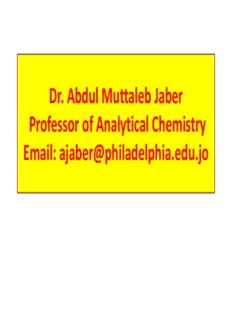
Dr. Abdul Muttaleb Jaber Professor of Analytical Chemistry PDF
Preview Dr. Abdul Muttaleb Jaber Professor of Analytical Chemistry
Dr. Abdul Muttaleb Jaber Professor of Analytical Chemistry Email: [email protected] 0510113 Pharmaceutical Chemical Analysis Textbook Analytical Chemsitry Gary D. Christian 6th Edition, 2004 Chapter 1 Analytical objectives or what analytical chemists do? What is analytical chemistry? • Analytical chemistry is the science that deals with the chemical characterization (qualitative and quantitative) of matter. • Analytical chemistry is applied in many aspects of chemistry: agricultural, clinical, environmental, forensic, manufacturing, metallurgical, and pharmaceutical chemistry. • The quality of manufactured products depends on proper chemical proportions of active components, and measurement of these components is the basis of the quality control/assurance of products. • Qualitative analysis deals with the identification of elements, ions, or compounds present in a sample. • Quantitative analysis deals with the determination of how much of one or mo re constituents is present. Classifying Analytical Methods 1. Wet methods of chemical analysis (Traditional or classical methods): • Gravimetric Methods: The analyte is precipitated by a certain reagent. The amount of the analyte is determined from the mass of the precipitate • Volumetric Methods: the concentration of the analyte is determined as a result of adding to it a measured volume of solution containing a reagent of known concentration to react completely with it. Analytical Methods 2. Instrumental Methods of analysis • Electroanalytical Methods: it involve the measurement of voltage, current, resistance, or quantity of electrical charge. • Spectroscopic Methods: it involves the interaction between electromagnetic radiation and matter (analyte atoms or molecules). • Chromatographic methods: it is based on separating the components of a mixture as a result of their degree of distribution between two phases (mobile and stationary phase) • Miscellaneous Methods: include rate of radioactive decay, heat of reaction, rate of reaction, thermal conductivity, optical activity, refractive index, and others THE ANAL YTICAL PROCESS The analytical process may be take place according to the following sequence of events: (1) defining the problem (2) obtaining a representative sample (3) preparing the sample for analysis (4) performing necessary chemical separations (5) performing the measurement (6) calculating the results and presenting the data. An analysis involves several steps and operations which depend on: •the particular problem • your expertise • the apparatus or equipment available. The analyst should be involved in every step. ©Gary Christian, Analytical Chemistry, 6th Ed. (Wiley) Fig. 1.1. Steps in an analysis Defining the problem • Before the analyst can design an analysis procedure, he / she must know • what information is needed? • what type of sample is to be analyzed • how the sample is to be obtained • how much of the sample is needed • how sensitive the method must be • how accurate and precise it must be? • what separations may be required to eliminate interferences. Acquiring the Sample • A laboratory analysis sample must be representative of the whole so that the final result of the chemical analysis represents the entire system • The material to be sampled may be solid, liquid, or gas. It may be homogeneous or heterogeneous in composition. – In the homogeneous case, a simple "grab sample" taken at random will suffice for the analysis. – In the heterogeneous case, we may be interested in the variation throughout the sample, in which case several individual samples will be required.
Description: